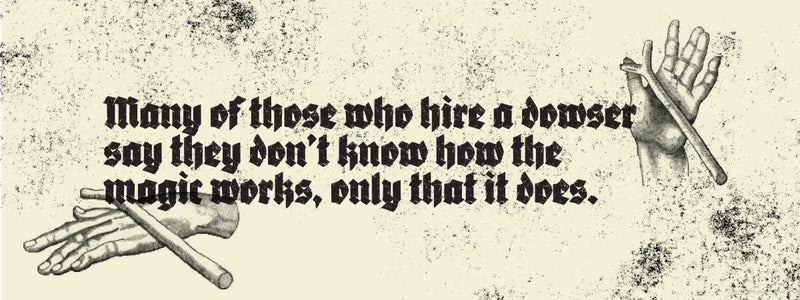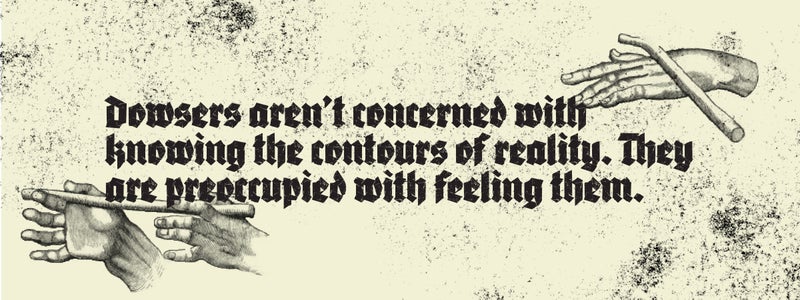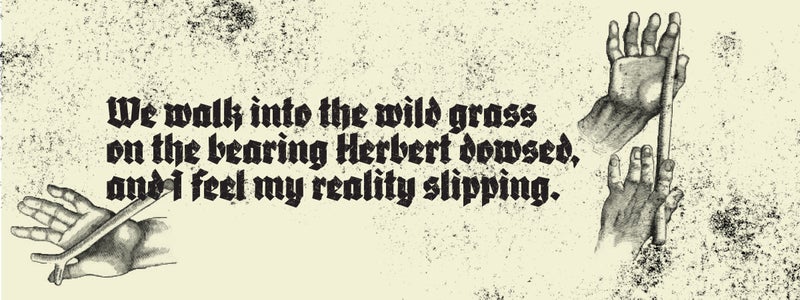Into the Mystical and Inexplicable World of Dowsing
For centuries, dowsers have claimed the ability to find groundwater, precious metals, and other quarry using divining rods and an uncanny intuition. Is it the real deal or woo-woo? Dan Schwartz suspends disbelief to see for himself.
New perk: Easily find new routes and hidden gems, upcoming running events, and more near you. Your weekly Local Running Newsletter has everything you need to lace up! .
Leroy Bull was a boy who felt things other children did not. He sensed that there was something right on the edge of his reality, in rural Bellefonte, Pennsylvania, where he grew up in the 1940s and ’50s. Sometimes it sent him messages, although at the time he did not know them as such. What he knew was that in school his eye was drawn out the window and into the woods, where his world hushed.
He quickly learned not to tell the other kids that sometimes, in these moments, he thought he glimpsed the future. Once, when he was older, he called his high school sweetheart and urged her to stay home from school. She hung up, ignored his advice, and broke her ankle that afternoon in gym. As a child, kids called Bull crazy. Was he? He didn’t know. He was surer of himself when he was alone.
There was an old strip mine up the road from his home, and he liked to walk there. The floor of the mine was unnaturally flat and its walls steeply sloped, but he would pick his way down a few times a week, enter that vast space, and feel small. There, he was most aware of the hush. It was like the bottom of a deep breath. It was as if he had grown wings and flown out of this world. Going down was always like returning.
People are most aware of the other side when they’re young, before they grow up and come to distrust what they can’t measure, he says now. Yet some adults retain the feeling, and they may pass along what they’ve learned to those who are open. Bull’s grandfather lived on a farm on the edge of Watertown, New York. He felt something, too.
Bull spent his summers on that farm in upstate New York punching cows, as he puts it, six days out of seven. One spring, on Easter Sunday, when Bull was 12 and he and his brother and the cousins were all up in the front yard, his grandfather disappeared into the woods. When he emerged, he was clutching half a dozen branches he’d cut from the willows. They were shaped like wishbones.
He handed the branches around and showed the kids how to hold them—palms skyward, points facing forward like the needle on a compass. Then he lined the children up before what he said was an underground vein of water that fed a black pitcher pump, and the old-timer told them to walk.
Well, the kids walked, and when they walked over the ground said to have water beneath it, a few of their rods, as it happened, dipped.
Bull’s was the first. His brother’s didn’t budge.
Afterward, their grandfather pulled Bull aside and said, “If you can learn to use that in your lifetime, do it, because it will probably help you.”
Bull would not realize for some time that what he had done that Easter Sunday was to channel the other side—the spirit world, as he calls it—which always felt strongest when he was close to Mother Nature, when the din of his world hushed and the messages from the other side rose in him like goose bumps. He would not learn until his twenties that he could call upon the hush to find things—water, minerals, utility lines—on a map; he would be in his forties before he learned to summon from the silence images of missing people or lost pets or misplaced wedding rings; and not until he was a half-century old would he realize, with shock, that on rare days he could project visions onto the landscape to guide him in his search, like the time a golden grid of shimmering lines snapped above the grass and led him to a well site. Bull’s calling, he would learn, was in finding things the old way, with his intuition as a guide and a forked stick as a pointer, like dowsers have for centuries. All his powers would come in time. It was on that Easter Sunday, when Bull was just a boy, that he took the first step: he learned to find water.









